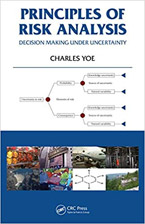 Charles Yoe
Charles Yoe
Editora CRC Press
Sinopse: In every decision context there are things we know and things we do not know. Risk analysis uses science and the best available evidence to assess what we know—and it is intentional in the way it addresses the importance of the things we don’t know. Principles of Risk Analysis: Decision Making Under Uncertainty lays out the tasks of risk analysis in a straightforward, conceptual manner that is consistent with the risk models of all communities of practice. It answers the questions “what is risk analysis?” and “how do I do this?”
Distilling the common principles of the many risk tribes and dialects into serviceable definitions and narratives, the book provides a foundation for the practice of risk analysis and decision making under uncertainty for professionals from all walks of life. In the first part of the book, readers learn the language, models, and concepts of risk analysis and its three component tasks—risk management, assessment, and communication. The second part of the book supplies the tools, techniques, and methodologies to help readers apply the principles. From problem identification and brainstorming to model building and choosing a probability distribution, the author walks readers through the how-to of risk assessment. Addressing the critical task of risk communication, he explains how to present the results of assessments and how to develop effective messages.
